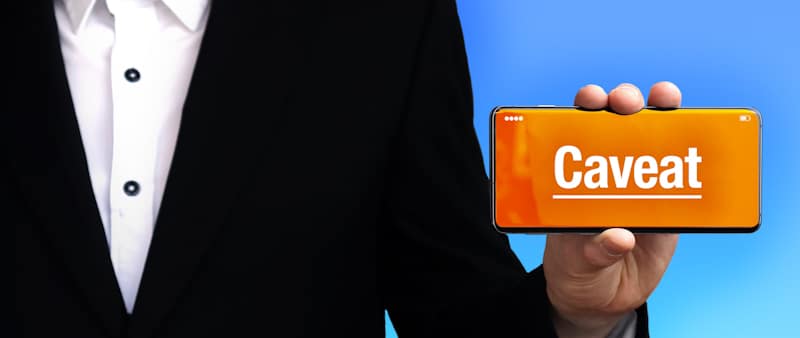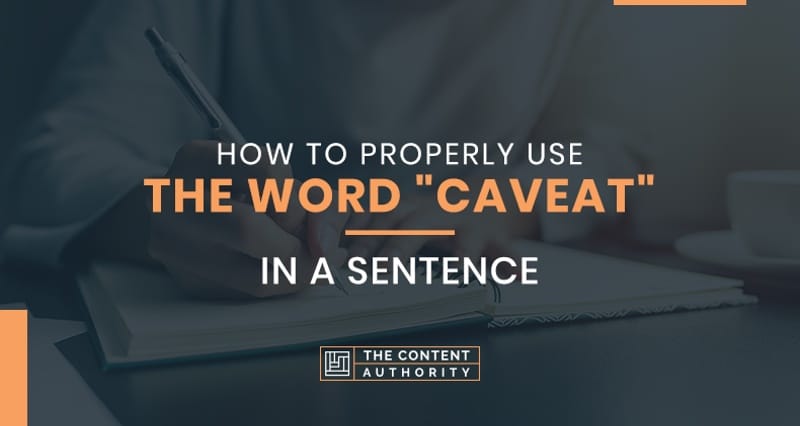In the right flow of words, the word caveat can make a lot of sense. However, it is a word not always used the proper way, and a failure to do so can cause a pretty confusing, and even embarrassing moment.

Before using the word without actual knowledge, it is crucial to know the definition of the word and how to use it in a sentence. What is the proper way to use the word caveat in a sentence?
Caveat is almost always used as a noun, and its original meaning is warning or caution. These days, it is also acceptable to use it as a word for a qualification or condition. On infrequent occasions, it also works as a verb.
The definition of caveat
The word caveat is a term stemming from Latin, where it translates literally to “let him beware”. It comes from the word cavēre. It started popping up initially as a word for warning or caution, and it remains the number one definition for the word in most cases.
What makes it a little complicated for some people is that it has evolved into a word that also can stand for a qualification or limitation. There is no right or wrong way of using caveat these days unless a person wants to go by the original meaning only. All dictionaries and other resources have updated caveat to having both meetings.
How long has the word caveat been used?
Caveat has been around as a word for centuries. Like a lot of words with Latin origin, the word started popping up in the 1500s and 1600s. The popularity of the word has not faded away too much. It has never been an incredibly popular word, but one that is well known enough to show up in newspaper publications, scholarly books, and more.
The reason why caveat never evolved into a more popular word is that it has more commonly used synonyms to convey the same message. Caveat, in casual discussions, has always been more of an alternative word in the English language, rather than the main word.
A historical connection to the word caution
The word caveat comes from the Latin word cavēre, and has made his way into the English language as a noun. Meanings include warning and caution, with the latter stemming from that very same Latin word.
Cavēre itself is a verb meaning “to be on guard.” The word caution is also a noun first and foremost like caveat, but it is also used as a verb from time to time. Caution is a much more common word used in everyday language, and therefore, usually takes the place of caveat in many situations.

Can caveat be used as a verb?
The word caveat is not used as a verb too often, but it does pop up from time to time. It is almost always used as a transitive verb, even if that was not originally A proper use.
Caveat is just one of many nouns that have evolved into a verb in some cases. It helps that the Latin root of the word is a verb, but it is usually not recommended to use caveat as a verb too often.
Examples of Caveat in a Sentence
- There is, of course, a caveat to playing the stock market: not everyone will end up a winner.
- Any advice from someone who has failed a class in the past comes with a caveat.
- It is always great to hear a caveat or two from those who have found themselves in a terrible situation before.
- The teacher failed to provide much instruction, but her one caveat included always being on time for class.
- One caveat to the NFL season in 2020 is that fans who do attend games can’t move around the stadium freely like in the past.
- There needs to be some caveat added to the agreement before moving forward.
- Before the new person can take over, there is the caveat that the current host will continue in their role until December.
- Make sure to read the full document before signing to recognize any potential caveats.
- Never make a final decision before understanding any random caveats.
- Most people who loan their car to a sibling will include the caveat that it returns with a full tank of gas.
- The caveat, of course is that the remediation process will be long and arduous.
- A standard caveat handed out by a judge to someone on probation includes a set amount of community service hours.
- Before subletting an apartment, make sure that there are no glaring caveats in the agreement.
- Journalists find it easy to land an interview, but some come with the caveat that direct quotes are off-limits
- There is almost always at least one caveat to every single argument, regardless of what side someone is on.
- Not everyone is a fan of people who can’t do anything nice without there being some caveat to the gesture.
- There are so many different caveats at some stores during sales that consumers might become confused.
- Make sure to always look for the big caveat in any new study that promises excellent results in the end.
- Here is a caveat about exploring different countries: not every location is going to be crazy about people coming into the country and not speaking the official language.
- Every single time someone signs up for a new membership, there is the caveat that rates are subject to change.
- The caveat to living in an apartment is that a person ends up paying someone else’s mortgage.
- It might seem like property investment is a sure thing, but there are a few crucial caveats everyone needs to understand before jumping in.
- Almost every single agreement between two individuals comes with at least one caveat.
- There is the fact that this always comes with a caveat, which needs to be understood before getting started.
- A man can seem kind and thoughtful, but there is always the potential caveat of that turning into flirtatious behavior.
- Reading a book with heavy influence from the subject always comes with a few caveats.
- As long as a person avoids the caveat of overcooking shrimp, it is pretty straightforward to prepare.
- There are always at least a few caveats when buying anything used online, especially in today’s climate.
- A sale might look great on paper, but there is usually at least a caveat or two that will frustrate people looking for specific items.
- One caveat: smaller locations do not tend to get the same type of inventory as larger stores in a big-name company.
- In nearly any trust fund fine print, there is at least a caveat or two that the child must be well aware of so they do not lose the money.
- Before failing to make a monthly payment, make sure that there is no caveat in the contract that might be a surprise.
- Every single caveat in a structured deal could impact the bottom line.
- The caveat is this has made us believe that capitalism is a monolithic social process.
- The bigger the caveat, the harder it is for a real deal to come to fruition.
- Going to a doctor with low rates can help people with no health insurance, but they usually come with a caveat or two.
- A person can try to file a caveat to secure an invention, as long as no patents already exist.
- A teacher Who leans one way or another politically should probably let their students know about any caveats in their lectures.
- It is better to throw in a caveat at the end of a speech rather than let it go without any mention.
- It is hard to throw a caveat in there without any proof to back it up.
- If any student is providing a caveat that seems troubling to others, they are immediately reported to law enforcement to protect others.
- If there is one thing to keep in mind, it is that there is a caveat with just about any deal.
Caveat emptor
As mentioned before, a lot of people first come across the word caveat in the saying caveat emptor. In Latin, this translates to “let the buyer beware.” It has turned into a bit of a proverb, especially in English-speaking countries. The reason why is it is part of contract law jargon.
The phrase acts as part of a disclaimer relating to the amount of information a buyer might have. In just about any transaction, the buyer has less information than the seller, so having some level of caveat emptor makes sense.
The full form of this phrase in Latin is “Caveat emptor, quia ignorare non debuit quod jus alienum emit.” This translates to “Let a purchaser beware, for he ought not to be ignorant of the nature of the property which he is buying from another party.”
Understanding the principle of caveat emptor
The principle of caveat emptor means that the buyer does not have a right to recover any damages from a seller. In the early days of common law, the caveat emptor rule helped in many marketplaces. It became more and more complex as commerce became more educated, and the buyer found themselves at a disadvantage. Buyers need to rely more on the honesty of the sellers and manufacturers, using their knowledge and research along the way.
By law, the condition of buying something comes with caveat emptor. Anything purchased will line up with the quality described by the seller, and the buyer will have the opportunity to examine the purchase to compare. If something is out of the ordinary, they can request a price adjustment or a refund if that is the case.
Some prices are so low that the caveat emptor relies on heavy examination from any buyer beforehand. This comes into play when something is listed “as-is” or when something needs to be fixed up as described in the listing. If there is an explanation in the listing, the buyer is made fully aware of expectations.

Caveat emptor in a sentence
- Every single sale is subject to the caveat emptor principle.
- If a car found online seems too good to be true, caveat emptor is always the rule to follow.
- A first-time homeowner should always be aware of caveat emptor before signing on the dotted line.
- Caveat emptor helps build trust between buyers and sellers in many ways.
- A good lawyer can help with any caveat emptor issues that might pop up.
Caveat lector
This is another phrase with a Latin origin, and it translates to read everywhere. Considered a proverb, it is a warning that usually comes in any type of literature or journalism that might not always have accurate information. In some instances, there are assumptions made, and bias could also be a factor.
A common phrase that means roughly the same thing is to “take with a grain of salt.” It is a warning for people not always to trust everything they read, especially if it seems too good to be true. “Do not believe everything you read” is another phrase that translates to this.
Using caveat lector in a sentence
Caveat lector is a phrase that does not always come in the form of a sentence, as it is more of a proverb. However, there are some occasions where people will use the phrase in a sentence that makes sense.
- Whenever a person receives an email in the junk account, caveat lector applies.
- People do not need to practice caveat lector with Wikipedia as much as before, but they do not always have the correct information.
- It is fine to report inaccuracies as long as the author uses caveat lector.
- When reading anything political around election time, caveat lector is recommended.
Shawn Manaher is the founder and CEO of The Content Authority. He’s one part content manager, one part writing ninja organizer, and two parts leader of top content creators. You don’t even want to know what he calls pancakes.

